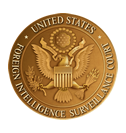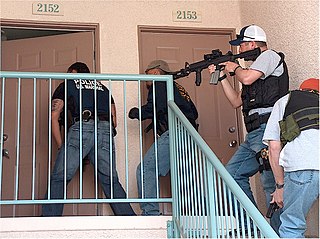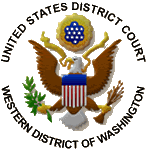Related Research Articles

The United States Foreign Intelligence Surveillance Court (FISC), also called the FISA Court, is a U.S. federal court established under the Foreign Intelligence Surveillance Act of 1978 (FISA) to oversee requests for surveillance warrants against foreign spies inside the United States by federal law enforcement and intelligence agencies.
New York Times Co. v. United States, 403 U.S. 713 (1971), was a landmark decision of the Supreme Court of the United States on the First Amendment right of Freedom of the Press. The ruling made it possible for The New York Times and The Washington Post newspapers to publish the then-classified Pentagon Papers without risk of government censorship or punishment.

The Espionage Act of 1917 is a United States federal law enacted on June 15, 1917, shortly after the United States entered World War I. It has been amended numerous times over the years. It was originally found in Title 50 of the U.S. Code but is now found under Title 18. Specifically, it is 18 U.S.C. ch. 37
Lawrence v. Texas, 539 U.S. 558 (2003), is a landmark decision of the U.S. Supreme Court in which the Court ruled that most sanctions of criminal punishment for consensual, adult non-procreative sexual activity are unconstitutional. The Court reaffirmed the concept of a "right to privacy" that earlier cases had found the U.S. Constitution provides, even though it is not explicitly enumerated. It based its ruling on the notions of personal autonomy to define one's own relationships and of American traditions of non-interference with private sexual decisions between consenting adults.
Executive privilege is the right of the president of the United States and other members of the executive branch to maintain confidential communications under certain circumstances within the executive branch and to resist some subpoenas and other oversight by the legislative and judicial branches of government in pursuit of particular information or personnel relating to those confidential communications. The right comes into effect when revealing the information would impair governmental functions. Neither executive privilege nor the oversight power of Congress is explicitly mentioned in the United States Constitution. However, the Supreme Court of the United States has ruled that executive privilege and congressional oversight each are a consequence of the doctrine of the separation of powers, derived from the supremacy of each branch in its area of constitutional activity.

The Freedom of Information Act, 5 U.S.C. § 552, is the United States federal freedom of information law that requires the full or partial disclosure of previously unreleased or uncirculated information and documents controlled by the U.S. government, state, or other public authority upon request. The act defines agency records subject to disclosure, outlines mandatory disclosure procedures, and includes nine exemptions that define categories of information not subject to disclosure. The act was intended to make U.S. government agencies' functions more transparent so that the American public could more easily identify problems in government functioning and put pressure on Congress, agency officials, and the president to address them. The FOIA has been changed repeatedly by both the legislative and executive branches.
American Civil Liberties Union v. Ashcroft is a lawsuit filed on behalf of a formerly unknown Internet Service Provider (ISP) owner by the American Civil Liberties Union against the U.S. federal government.
McConnell v. Federal Election Commission, 540 U.S. 93 (2003), is a case in which the United States Supreme Court upheld the constitutionality of most of the Bipartisan Campaign Reform Act (BCRA), often referred to as the McCain–Feingold Act.
Tenet v. Doe, 544 U.S. 1 (2005), is a United States Supreme Court case in which the court ruled unanimously that spies cannot sue the CIA or the United States government to enforce an espionage contract. The court ruled that allowing such suits jeopardize the protection of state secrets.
The state secrets privilege is an evidentiary rule created by United States legal precedent. Application of the privilege results in exclusion of evidence from a legal case based solely on affidavits submitted by the government stating that court proceedings might disclose sensitive information which might endanger national security. United States v. Reynolds, which involved alleged military secrets, was the first case that saw formal recognition of the privilege.
United States v. Reynolds, 345 U.S. 1 (1953), is a landmark legal case decided in 1953, which saw the formal recognition of the state secrets privilege, a judicially recognized extension of presidential power. The US Supreme Court confirmed that "the privilege against revealing military secrets ... is well established in the law of evidence".

Knock-and-announce, in United States law criminal procedure, is an ancient common law principle, incorporated into the Fourth Amendment, which requires law enforcement officers to announce their presence and provide residents with an opportunity to open the door prior to a search.
Totten v. United States, 92 U.S. 105 (1876), is a United States Supreme Court case in which the court ruled on judicial jurisdiction in espionage cases. The case was an important precursor to the court's 1953 decision in United States v. Reynolds wherein it recognized the State Secrets Privilege. The case was later referenced and its holding expanded by the Court in the 2005 case of Tenet v. Doe and then again in General Dynamics Corp. v. United States. In Tenet, which involved a contract claim against the CIA brought by Cold War era spies, Court clarified that “Totten precludes judicial review in cases. .. where success depends upon the existence of their secret espionage relationship with the government.” In General Dynamics, the Court held that the same logic applied outside the espionage context, with the limitation that “[b]oth parties—the government no less than petitioners—must have assumed the risk that state secrets would prevent the adjudication of claims of inadequate performance."
In United States law, habeas corpus is a recourse challenging the reasons or conditions of a person's detention under color of law. The Guantanamo Bay detention camp is a United States military prison located within Guantanamo Bay Naval Base. A persistent standard of indefinite detention without trial and incidents of torture led the operations of the Guantanamo Bay detention camp to be challenged internationally as an affront to international human rights, and challenged domestically as a violation of the Due Process Clause of the Fifth and Fourteenth amendments of the United States Constitution, including the right of petition for habeas corpus. In 19 February 2002, Guantanamo detainees petitioned in federal court for a writ of habeas corpus to review the legality of their detention.
Ziglar v. Abbasi, 582 U.S. ___ (2017), is a Supreme Court of the United States case in which the Court determined, by a vote of 4-2, that non-U.S. citizens detained in the aftermath of the September 11 attacks cannot recover monetary damages from high level federal officials for the conditions of their confinement. The case was consolidated with Hastey v. Abbasi, and Ashcroft v. Abbasi. It was argued on January 18, 2017.
Gibson, Dunn & Crutcher LLP is an American multinational law firm headquartered in Los Angeles, California. Founded in 1890, the firm includes approximately 1,400 attorneys and 1,000 staff located in 20 offices around the world, including North and South America, Europe, Asia, and the Middle East. The firm is known for its litigation practice, and in particular its strength in appellate law.
Joan Biskupic is an American journalist, author, and lawyer who has covered the United States Supreme Court since 1989.

Microsoft Corporation v. United States of America was a complaint for declaratory judgment action filed in the U.S. District Court in Seattle, Washington. At issue was the 1986 Electronic Communications Privacy Act. with Microsoft arguing that secrecy orders were preventing them from disclosing warrants to customers in violation of the company's and customers' rights. The case was started in April 2016 and although the government bid for dismissal of the suit, in February 2017 a federal judge set a trial date set for June 2018. Microsoft was supported in its lawsuit by companies such as Amazon, Apple, Google, Dropbox and Salesforce. The case was dropped by Microsoft in October 2017 after policy changes at the Department of Justice. Although no laws were changed, the new DOJ policy "changed data request rules on alerting Internet users about agencies accessing their information," and mandated defined periods of time for secrecy orders from the government. Although the change represented "most of what Microsoft was asking for," Microsoft did not rule out future litigation.
In re Oliver, 333 U.S. 257 (1948), was a decision by the United States Supreme Court involving the application of the right of due process in state court proceedings. The Sixth Amendment in the Bill of Rights states that criminal prosecutions require the defendant "... to be informed of the nature and cause of the accusation...and to have the Assistance of Counsel for his defence." In this case, a witness in a Michigan grand jury hearing was convicted and sentenced to jail without either notice or attorney assistance.
Trump v. Vance, 591 U.S. ___ (2020), was a landmark US Supreme Court case arising from a subpoena issued in August 2019 by Manhattan District Attorney Cyrus Vance Jr. against Mazars, then-President Donald Trump's accounting firm, for Trump's tax records and related documents, as part of his ongoing investigation into the Stormy Daniels scandal. Trump commenced legal proceedings to prevent their release.
References
- ↑ M. K. B. v. Warden, 540 U.S. 804(2003).
- ↑ M. K. B. v. Warden, 540 U.S. 1213(2004).
- ↑ CNN.com - Supreme Court requests government to justify secret detention - Nov. 5, 2003
- ↑ News Groups Seek to Open Secret Case – New York Times
- ↑ CNN.com - Court declines appeal on 9/11 secrecy - Feb. 23, 2004